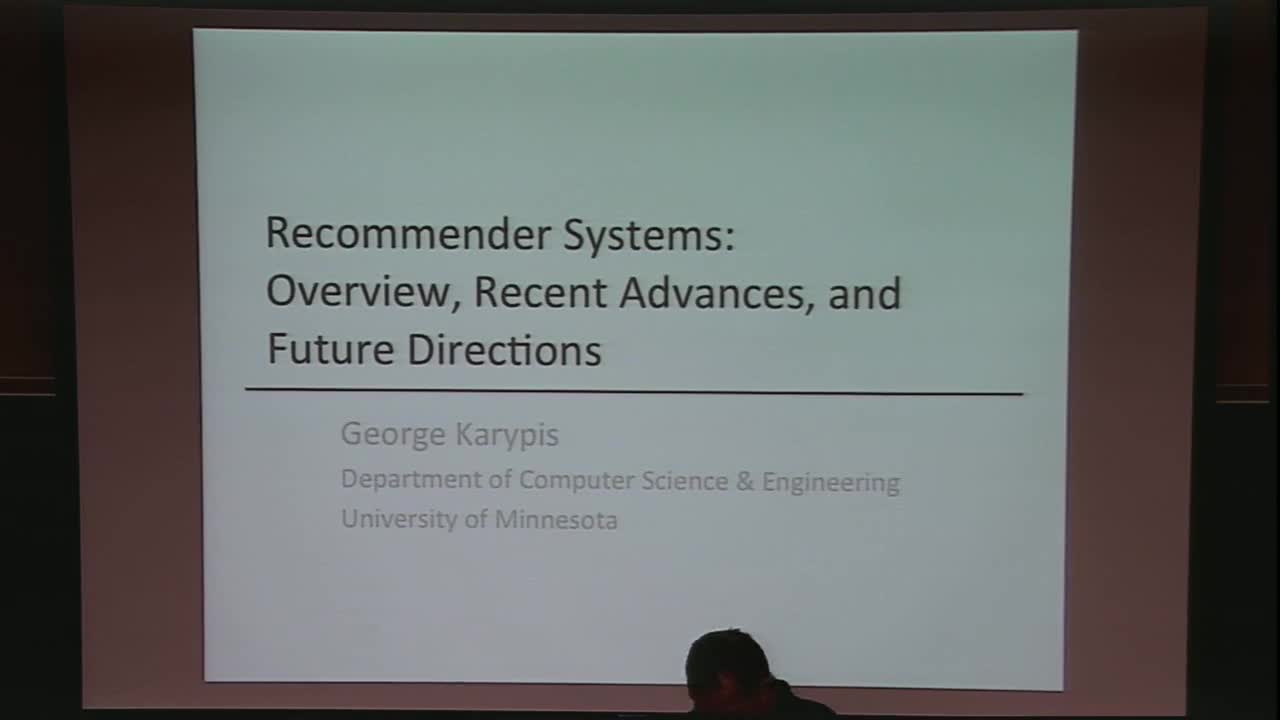Recent Advances in Recommender Systems and Future Directions
Presenter
March 22, 2016
Keywords:
- Recommender Systems; Future Directions; information filtering
MSC:
- 94A12
Abstract
Recommender systems are designed to identify the items that a user will like or find useful based on the user’s prior preferences and activities. These systems have become ubiquitous and are an essential tool for information filtering and (e-)commerce. Over the years, collaborative filtering, which derive these recommendations by leveraging past activities of groups of users, has emerged as the most prominent approach for solving this problem. Among the multitude of methods that have been developed, user- and item-based nearest-neighbor approaches are the simplest to understand and are easily extended to capture different user behavioral models and types of available information. However, in their classical forms, the performance of these methods is worse than latent-space approaches.
This talk presents an overview of recent methodological advances in developing nearest-neighbor-based recommender systems that have substantially improved their performance. The key components in these methods are: (i) the use of statistical learning to estimate from the data the desired user-user and item-item similarity matrices, (ii) the use of lower-dimensional representations to handle issues associated with sparsity, (iii) the combination of neighborhood and latent space models, and (iv) the direct incorporation of auxiliary information during model estimation. The talk will provide illustrative examples for these methods in the context of item-item nearest-neighbor methods for rating prediction and Top-N recommendation. In addition, the talk will present an overview of exciting
new application areas of recommender systems along with the challenges and opportunities associated with them.
George Karypis is an ADC Chair of Digital Technology Professor at the Department of Computer Science & Engineering at the University of Minnesota, Twin Cities. His research interests spans the areas of data mining, high performance computing, information retrieval, collaborative filtering, bioinformatics, cheminformatics, and scientific computing. His research has resulted in the development of software libraries for serial and parallel graph partitioning (METIS and ParMETIS), hypergraph partitioning (hMETIS), for parallel Cholesky factorization (PSPASES), for collaborative filtering-based recommendation algorithms (SUGGEST), clustering high dimensional datasets (CLUTO), finding frequent patterns in diverse datasets (PAFI), and for protein secondary structure prediction (YASSPP). He has coauthored over 250 papers on these topics and two books (“Introduction to Protein Structure Prediction: Methods and Algorithms” (Wiley, 2010) and “Introduction to Parallel Computing” (Publ. Addison Wesley, 2003, 2nd edition)). In addition, he is serving on the program committees of many conferences and workshops on these topics, and on the editorial boards of the IEEE Transactions on Knowledge and Data Engineering, ACM Transactions on Knowledge Discovery from Data, Data Mining and Knowledge Discovery, Social Network Analysis and Data Mining Journal, International Journal of Data Mining and Bioinformatics, the journal on Current Proteomics, Advances in Bioinformatics, and Biomedicine and Biotechnology.
